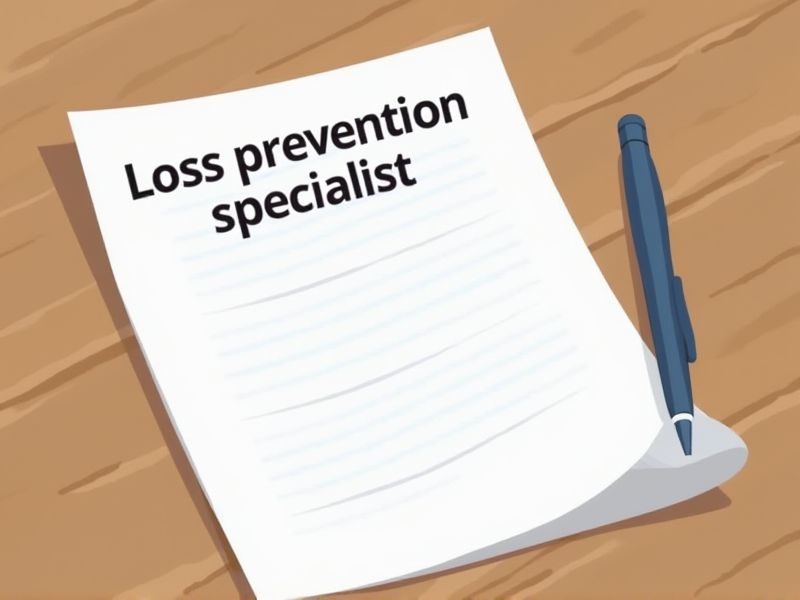
Loss prevention specialists play a critical role in minimizing theft and fraud within an organization, making certification crucial in providing a competitive edge. Certifications deepen knowledge in risk management and safety practices, ensuring professionals can effectively safeguard assets. They also signify a level of expertise recognized and respected in the field, often leading to enhanced career opportunities. Below are key certifications valuable for a Loss Prevention Specialist.
Certified Loss Prevention Professional (CLPP)
A Certified Loss Prevention Professional credential is crucial as it affirms expertise in identifying and reducing risks in retail environments. Certification provides specialized knowledge in theft prevention techniques, directly impacting a company's bottom line by minimizing losses. The credential also enhances professional credibility, increasing trust from employers and potential clients. A certified specialist remains updated on the latest industry practices and technologies, maintaining an organization's competitive edge in asset protection.
Certified Fraud Examiner (CFE)
A Certified Fraud Examiner (CFE) possesses specialized knowledge in identifying and preventing fraudulent activities, which enhances the effectiveness of a loss prevention specialist in safeguarding assets. Expertise in fraud detection methods equips CFEs to implement strategies reducing the risk of financial losses. Their understanding of legal regulations ensures that preventive measures comply with industry standards. Collaboration between CFEs and loss prevention specialists results in more comprehensive protective frameworks, minimizing potential security breaches.
Certified Protection Professional (CPP)
A Certified Protection Professional (CPP) enhances the skillset of a Loss Prevention Specialist by providing advanced knowledge and expertise in security management practices. As the complexity of security challenges increases, CPP certification ensures the specialist is equipped with strategies to mitigate risks effectively. The credential instills confidence in stakeholders, ensuring that security measures align with international standards and best practices. Businesses rely on CPP-certified specialists to develop comprehensive loss prevention plans that minimize potential financial losses and protect assets.
Physical Security Professional (PSP)
Any organization focused on loss prevention benefits from a Physical Security Professional (PSP) because they bring specialized skills in identifying and mitigating security risks. Their expertise in evaluating and implementing physical security measures leads directly to the protection of assets, reducing theft and vandalism. A PSP's ability to develop effective security protocols enhances overall safety, which minimizes incidents that could result in financial loss. By conducting thorough risk assessments, they ensure that loss prevention strategies are not only reactive but also proactive, thereby optimizing resource allocation.
Certified Security Manager (CSM)
A Certified Security Manager enhances a loss prevention specialist's effectiveness by introducing advanced risk assessment techniques, which reduce potential vulnerabilities. They implement structured security protocols, leading to minimized theft and asset loss. With expertise in crisis management, a CSM ensures rapid response to incidents, mitigating damage and protecting brand reputation. Their knowledge in regulatory compliance helps avoid legal penalties, contributing to overall organizational stability.
Professional Certified Investigator (PCI)
Hiring a Professional Certified Investigator (PCI) often enhances a loss prevention specialist's ability to accurately identify and address potential fraud and theft incidents. The PCI certification provides specialized training in investigative techniques, leading to more effective evidence collection and analysis. A PCI can also elevate compliance with legal and regulatory standards, reducing the risk of costly legal disputes. With advanced skills in risk assessment, PCI-certified professionals can improve overall security strategies and minimize financial losses for their organizations.
OSHA Safety Certification
OSHA Safety Certification is needed for a Loss Prevention Specialist to ensure adherence to workplace safety standards, which reduces the risk of accidents and injuries. Compliance with OSHA guidelines provides a foundation for creating safer environments, leading to lower insurance premiums and legal liabilities. A certified specialist is better equipped to identify potential hazards and implement preventive measures effectively. Having an OSHA Safety Certification enhances the credibility and skills of a Loss Prevention Specialist, making them more valuable to employers.
Certification in Risk Management (CRM)
Certification in Risk Management (CRM) enhances a loss prevention specialist's ability to identify and assess potential risks accurately. This credential provides structured knowledge on implementing effective risk mitigation strategies, crucial for minimizing losses. Industry-recognized certification increases employability and can lead to career advancement opportunities. Possessing CRM validates a specialist's expertise, fostering trust among employers and clients.
First Aid/CPR Certification
Loss prevention specialists often deal with emergencies, and First Aid/CPR certification prepares them to respond effectively to sudden medical incidents. In high-stress retail environments, incidents like fainting or minor injuries are more likely, necessitating immediate care. With such certification, specialists can stabilize a person's condition until professional medical help arrives. Companies recognize this capability as enhancing workplace safety and potentially reducing liability.
Certified Safety Professional (CSP)
A Certified Safety Professional (CSP) credential enhances a loss prevention specialist's ability to identify workplace hazards, leading to more effective risk management. With CSP training, professionals gain deep insights into safety regulations, ensuring compliance and minimizing liabilities for organizations. This credential equips specialists with advanced analytical skills, enabling them to craft proactive strategies reducing potential losses. Achieving CSP status validates a specialist's expertise, instilling greater trust and credibility among employers and colleagues.
Summary
You can expect increased credibility and recognition in the field when you obtain certifications as a loss prevention specialist. With enhanced skills and knowledge, your ability to effectively mitigate risks and reduce losses will improve. Certified professionals often experience career growth opportunities due to their specialized expertise. Employers are more likely to trust and invest in those who demonstrate commitment through certification.
